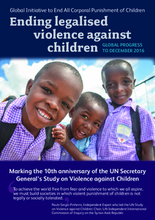This comprehensive report discusses progress made towards universal prohibition of corporal punishment of children, including by highlighting examples from individual states that have recently implemented legal and policy reforms. Since its last edition in 2015, three additional states – Mongolia, Paraguay and Slovenia – prohibited all corporal punishment, including in the home, bringing the total number of prohibiting states to 51. Greenland – a self-governing territory within the Kingdom of Denmark – As part of the Universal Periodic Review of their overall human rights records, six more states – Micronesia, Mozambique, Namibia, Oman, Seychelles and Sierra Leone – clearly accepted recommendations to prohibit corporal punishment in all settings, bringing the number of states clearly committed to prohibiting all corporal punishment to 55. In many of these states, draft laws or bills are under discussion which would achieve prohibition, including for example in Chile, Guatemala, Lithuania, Mauritius and Montenegro.
Despite these significant advances, there are still 147 states where children can be lawfully hit in the family home, 140 where violent punishment remains lawful in alternative care settings and in day care, 69 where it is not prohibited in all schools and 60 lacking protection for children in penal institutions. In 34 states, children found to have committed an offence may be sentenced to corporal punishment under criminal, religious and/or traditional law; and in 17 states corporal punishment is not prohibited in any setting. Just 10% of the world’s children live in states where the law recognises their right to protection from all violent punishment and to equal protection from assault.
The report presents the rationale and foundation for prohibiting and eliminating corporal punishment under international human rights law. It discusses the signicance of the adoption of an indicator specifically relating to prevalance of physical punishment as part of three indicators which will be used to monitor progress towards achieving Target 16. 2 under the 2030 Agenda for Sustainable Development: “End abuse, exploitation, trafficking and all forms of violence against and torture of children”. (Indicator 16.2.1: “Percentage of children aged 1-17 who experienced any physical punishment and/or psychological aggression by caregivers in the past month”. The report points out that "the adoption of this indicator recognises the centrality of prohibiting and eliminating corporal punishment for ending all violence against children and achieving other Sustainable Development Goals, including those on health, education, violence against women and girls and equality."

